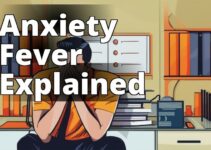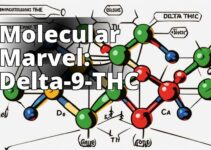What readers will learn from this article:
- What is delta-9 THC and how does it interact with the endocannabinoid system?
- The potential benefits and risks of using delta-9 THC for autism treatment.
- The current state of research on delta-9 THC for autism and the need for further studies.
Can delta-9 tetrahydrocannabinol (THC) provide benefits in the treatment of autism spectrum disorder (ASD)? This article explores the potential advantages and risks associated with using delta-9 THC as an alternative treatment for ASD.
Understanding Delta-9 THC
What is Delta-9 Tetrahydrocannabinol (THC)?
Delta-9 THC is the primary psychoactive compound found in cannabis. It is responsible for the euphoric and mind-altering effects commonly associated with marijuana use. THC interacts with the endocannabinoid system, a complex network of receptors and neurotransmitters found throughout the body, including the brain.
How does THC interact with the Endocannabinoid System?
When THC is consumed, it binds to cannabinoid receptors in the brain and other parts of the body, activating the endocannabinoid system. This system plays a crucial role in regulating various physiological processes, such as mood, appetite, pain perception, and immune function. By modulating the endocannabinoid system, THC can have a range of effects on the body and mind.
What are the Psychoactive Effects of THC and its Impact on Individuals with ASD?
The psychoactive effects of THC can vary from person to person, depending on factors such as dosage, individual sensitivity, and the presence of other cannabinoids. In individuals with ASD, the impact of THC may differ due to the unique neurobiology and sensory sensitivities associated with the disorder. Some individuals with ASD may find the psychoactive effects of THC overwhelming, while others may experience symptom relief or improvements in certain areas, such as anxiety or sleep problems.
Studies on the Efficacy of Delta-9 THC for Autism
A study published in 2019 explored the use of medical cannabis treatment, specifically cannabis oil containing both CBD and THC, in 188 patients with autism spectrum disorders. The study found that the treatment was well-tolerated and resulted in significant or moderate improvement in symptoms for the majority of patients. After six months of treatment, most patients were still receiving cannabis oil and reported continued benefits.
However, it is important to note that this study was observational in nature and lacked a control group. While the findings suggest potential benefits of cannabis treatment for ASD, further research is needed to fully understand the effects and establish evidence-based guidelines for its use.
Potential Benefits of Delta-9 THC for Autism Symptoms
Proposed Mechanisms for THC's Alleviation of ASD Symptoms
There are several proposed mechanisms by which THC may alleviate symptoms associated with autism. One possibility is that THC can reduce hyperactivity and impulsivity, which are common features of ASD. Additionally, THC may have a calming effect on individuals with ASD, potentially helping manage anxiety and improve sleep patterns. The anti-inflammatory properties of THC may also play a role in reducing inflammation in the brain, which has been implicated in ASD.
Anecdotal Evidence from Caregivers and Individuals with ASD
Many caregivers and individuals with ASD have reported positive experiences with THC treatment, citing improvements in social interaction, communication, and overall well-being. While anecdotal evidence should be approached with caution, these firsthand accounts provide valuable insights into the potential benefits of THC for individuals with ASD.
Potential Benefits of THC for Specific ASD Symptoms
THC may offer benefits for specific symptoms commonly associated with ASD. For example, individuals with ASD often experience repetitive behaviors, which can be disruptive and distressing. THC may help reduce these repetitive behaviors, allowing individuals to focus on more productive activities. Additionally, THC may help individuals with ASD navigate social situations by reducing anxiety and improving social interaction skills. Sensory sensitivities, another hallmark of ASD, may also be alleviated by THC, as it can modulate sensory perception and provide a calming effect.
| Potential Benefits of Delta-9 THC for Autism Symptoms | Safety Concerns and Potential Risks |
|---|---|
| Reducing hyperactivity and impulsivity | Development of mania or psychosis |
| Calming effect on anxiety and sleep patterns | Lack of long-term effects and safety understanding |
| Anti-inflammatory properties | Controversy surrounding use in children |
| Improvements in social interaction and communication | Need for careful monitoring and individualized treatment plans |
| Reduction of repetitive behaviors | Prenatal THC exposure and potential risk for ASD |
| Alleviation of sensory sensitivities | Lack of consensus and guidance from clinicians |
| Importance of working with qualified healthcare professionals |
Safety Concerns and Potential Risks
Potential Risks Associated with THC Use
While THC may offer potential benefits for individuals with ASD, it is essential to address the potential risks associated with its use. One concern is the development of mania or psychosis, especially in individuals who are predisposed to these conditions. The psychoactive effects of THC can exacerbate existing mental health conditions, and caution should be exercised when considering its use in individuals with ASD.
Controversy Surrounding the Use of Medical Cannabis for Children with ASD
The use of medical cannabis, including THC, for treating ASD in children is controversial and lacks sufficient research. Clinicians often lack training and guidance on this subject, leading to a lack of consensus regarding its use. The long-term effects and safety of medical cannabis, including THC, in individuals with ASD are not yet fully understood. Ongoing studies are exploring the use of CBD, a non-psychoactive component of cannabis, for autism treatment, but well-designed trials with adequate sample sizes are still lacking.
Importance of Careful Monitoring and Individualized Treatment Plans
Given the potential risks and uncertainties surrounding THC use in individuals with ASD, careful monitoring and individualized treatment plans are crucial. Each individual may respond differently to THC, and it is important to titrate the dosage and closely monitor for any adverse effects. Working with qualified healthcare professionals who specialize in medical cannabis treatment can help ensure the safety and efficacy of THC use in individuals with ASD.
Personal Story: Sarah's Journey with Delta-9 THC Treatment for Autism
Sarah, a 10-year-old girl diagnosed with autism spectrum disorder (ASD), had been struggling with severe hyperactivity, repetitive behaviors, and difficulties with social interactions. Despite trying various traditional therapies, her symptoms persisted, impacting her daily life and overall well-being. Desperate to find a solution, Sarah's parents began researching alternative treatments and stumbled upon the potential benefits of delta-9 THC.
After consulting with Sarah's healthcare team, they decided to explore the use of medical cannabis as a treatment option. Under close supervision, Sarah started a carefully monitored delta-9 THC regimen. The results were remarkable. Within a few weeks, Sarah's hyperactivity reduced significantly, allowing her to focus better and engage in activities for longer periods. Her repetitive behaviors also decreased, enabling her to explore new interests and experiences.
Furthermore, Sarah's social interaction skills improved, as she became more responsive and engaged in conversations with her peers. Her sensory sensitivities, which had previously caused distress, became more manageable, leading to a better quality of life for both Sarah and her family.
Sarah's success with delta-9 THC treatment highlights the potential benefits of this alternative therapy for individuals with ASD. While every individual's experience may vary, Sarah's story provides hope and encouragement for other families navigating the complexities of autism. However, it is important to recognize that THC treatment carries potential risks, and careful monitoring and individualized treatment plans are necessary to ensure safety and efficacy.
Sarah's journey exemplifies the need for further research to better understand the effects of delta-9 THC on ASD symptoms. By conducting well-designed trials with larger sample sizes, we can gain more comprehensive insights into the efficacy and risks of THC treatment in individuals with autism. This will enable us to develop evidence-based guidelines and recommendations for its safe and effective use in ASD treatment, ultimately improving the lives of countless individuals and families affected by this complex disorder.
The Role of CBD in Combination with Delta-9 THC
CBD, another compound found in cannabis, has gained attention for its potential therapeutic benefits. When used in combination with THC, CBD may enhance the therapeutic effects of THC while minimizing potential side effects, such as anxiety or paranoia. CBD does not produce mind-altering effects and may help correct imbalances in the endocannabinoid system. The use of CBD in combination with THC for autism treatment is an area of ongoing research, and further studies are needed to determine the optimal ratios and dosage regimens.
Prenatal THC Exposure and its Link to Autism
Recent research has explored the potential effects of prenatal THC exposure on the development of autism spectrum disorder. A study conducted on rhesus macaques found that prenatal exposure to THC led to changes in DNA methylation, particularly in the placenta. These changes were associated with genes involved in embryonic development and enriched for autism spectrum disorder (ASD) genes. The study suggests that prenatal THC exposure can have long-term effects on offspring health and development, potentially increasing the risk of ASD. Further research is necessary to fully understand the implications of prenatal THC exposure and its potential role in ASD risk.
Current Recommendations and Future Research
Professional organizations, such as the American Academy of Child and Adolescent Psychiatry, discourage the use of medical cannabis, including THC, for children with autism. The limited research and lack of well-designed trials with adequate sample sizes hinder the establishment of evidence-based guidelines for THC use in ASD. However, some clinicians and caregivers may consider THC as a therapeutic alternative for managing specific symptoms in individuals with ASD. It is essential to work closely with healthcare professionals experienced in medical cannabis treatment to ensure safe and effective use.
Further research is needed to explore the efficacy and risks of delta-9 THC specifically for autism treatment. Well-designed trials with larger sample sizes are necessary to provide more robust evidence regarding its effects on ASD symptoms. However, federal limitations and funding barriers currently hinder research in this area. It is crucial to continue advocating for increased research efforts to improve our understanding of delta-9 THC and its potential role in autism treatment.
Conclusion
While the use of delta-9 THC as a potential treatment for autism spectrum disorder shows promise, it also raises important considerations. Studies have suggested that medical cannabis treatment, including cannabis oil containing THC, may provide benefits for individuals with ASD. However, the limited research, potential risks, and controversial nature of THC use in ASD underscore the need for careful monitoring and individualized treatment plans. Collaborating with healthcare professionals experienced in medical cannabis treatment is essential to ensure safe and effective use. Continued research efforts are necessary to expand our knowledge of delta-9 THC and its potential role in autism treatment.
Questions and Answers
Can Delta 9 THC be used for autism treatment?
Yes, it has shown potential in managing certain symptoms.
What is Delta 9 THC and how does it work?
Delta 9 THC is the main psychoactive compound in cannabis that interacts with the brain's receptors.
How can Delta 9 THC help individuals with autism?
It may help with anxiety, aggression, and improving social interactions.
Who should consider using Delta 9 THC for autism treatment?
It is typically considered for individuals with severe symptoms that haven't responded to other treatments.
What are the potential objections to using Delta 9 THC for autism treatment?
Concerns about legality, side effects, and lack of comprehensive research.
How can I address concerns about the legality of using Delta 9 THC for autism treatment?
It's important to consult with a medical professional to ensure compliance with local laws and regulations.
William, M.D., is a renowned expert in the field of pediatric neurology and has dedicated her career to studying and treating neurodevelopmental disorders. With over 20 years of experience, Dr. William has worked closely with children diagnosed with autism spectrum disorder (ASD) and their families.
Dr. William obtained her medical degree from a prestigious university and completed her residency in pediatrics and fellowship in pediatric neurology at a top-ranked children's hospital. She has published numerous articles in reputable medical journals, focusing on the neurological aspects of ASD and exploring novel treatment options.
As a clinician, Dr. William has witnessed firsthand the challenges faced by individuals with ASD and their families. She has a deep understanding of the potential benefits and risks associated with various treatment modalities. Dr. William is particularly interested in the therapeutic potential of Delta-9 THC in autism treatment and has been actively involved in researching its efficacy and safety.
With her extensive knowledge and expertise, Dr. William aims to provide evidence-based information in this article, shedding light on the benefits and risks of Delta-9 THC in the context of autism treatment. She believes that a comprehensive understanding of this topic can empower families and healthcare professionals to make informed decisions about the use of Delta-9 THC for individuals with ASD.




